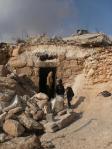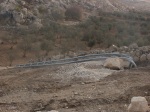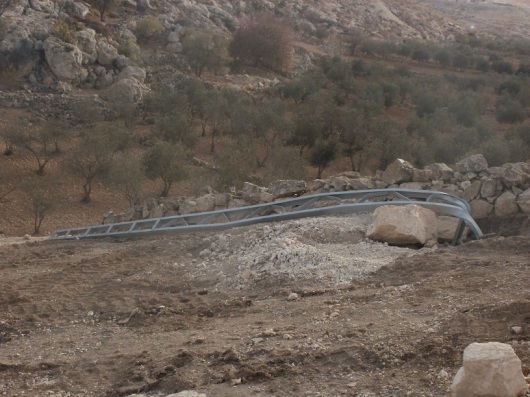World-renowned scholar and
Taayush activist David Shulman in one of his finest reports.
Nothing dramatic, just a few hours in the life of one shepherd in south Mt. Hebron- the routine of the occupation in this area, accompanied with much insight to the feelings and thoughts of the non-violent activists of Taayush. It’s a bit of a long reading, but a most rewarding one.
Ehud Krinis
Villages Group
————————–
January 30, 2010 Al-Tal’a, Um Zaituna
“The most desperate fights are often the most hopeful,” Istvan says to me as we stand on the hill looking down at the shepherds and their sheep. You can always rely on Istvan for the surprising Hungarian perspective on things—not usually an optimistic one, but humane and morally acute in a dark, perhaps ironic way. This is his fourth trip with us to South Hebron. He likes the Ta’ayush mode, which he thinks exemplifies the central Gandhian principle: what is inside shapes what is outside; if you can overcome your own weaknesses and fear, you will have an incalculable effect on the most recalcitrant situation. Besides, there’s another consideration of a totally non-instrumental nature. He cites an extreme example. Those Germans and Poles and others who saved the lives of Jews during the Nazi period didn’t do it to defeat Nazism; they did it because it was right, a moral act in need of no justification or corroboration outside itself.
This comes as a timely reminder, because yesterday afternoon I was harangued at some length by a former colleague, a Russian humanist of the old school, by now thoroughly disillusioned: in a struggle, he said, between those with principles, driven by moral concerns, and what he calls the “Hottentot” rule—”If I take your wife, that is good; if you take my wife, that is bad”—in such a struggle, the Hottentots will always win. [I hope my Hottentot readers will forgive him, and me.] Moral scruples, in short, always weaken you; it’s the thugs who come out on top. So here we are in the living laboratory of South Hebron, where we can perform an experiment, in real time, to test these two opposed hypotheses.
We’ve come to accompany the Palestinian shepherds, who have been harassed in recent days even more than usual by Israeli settlers. The settlers, backed up by the army and the police, are constantly driving the shepherds at gunpoint off their historic grazing grounds; sometimes they beat them or throw rocks at them or even shoot at them for good measure. We divide up into three groups, each one responsible for one large herd; I am entrusted with the Al-Tal’a/ Um Zaituna contingent. I find Jamil, together with some 80 or 90 sheep and four of his young sons and other boys, on the rocky slope just under the cow-barn of the Maon settlement. He gives me a radiant welcome, his face alight with pleasure; Jamil is a true bon vivant, odd as the term might sound in the harsh desert setting of South Hebron. (You can see him in the attached picture.)

Jamil and his son
He’s also monolingual in Arabic, a great advantage for me. He tells me that this morning settlers have already pointed their guns at him and his sons and told him to go away—or they would shoot. I think the sheep and the children are still a little too close to the settlement, and together we decide they’ll move some ways down the hill.
So far so good. The sheep are also happy—these slopes, normally inaccessible to Palestinian shepherds, are thick with fresh green undergrowth and the delicious thorny leaves the sheep adore. It’s rained a bit this winter; the soil is reviving under wind and winter cloud, a ravishing pastiche of green and grey. Here the name of the game, as we know well, is somehow to gain time—an hour, two, three, long enough for the herd to graze to its fill before the soldiers and the settlers turn up, as they always do. I have instructions from Amiel to avoid confrontation this time: if we see them approaching, we are to get the shepherds out of danger as quickly as we can. No arrests, if possible, today.
We talk, we laugh, we play. Jamil wants me to mount his donkey, Humara. How is it? he asks after I’ve clambered up on top. Much better than driving a car, I say. The children, as always, want their picture taken; they solemnly introduce themselves and, one by one, come to shake our hands. “Are you afraid of the soldiers?” little Ibrahim asks me, and I say, “No, not afraid, but I don’t want any trouble for you.” An hour goes by, wind whipping at our faces. I dismount from Humara. There is dust in the air, a sign of coming storm.
First we see the police cars driving up to Maon, blue lights flashing. They sit there, waiting. I’m hoping they just came by to have a look and won’t come at us, especially since we’ve now opened up a substantial gap between the herd and the outer perimeter of the settlement. But of course the hope is quickly dashed. A large posse of soldiers and cops is soon marching toward us over the rocks. They reach Zvi and the other Um Zaituna flock first. Even at a distance, I can see them performing the remorseless stages of their beloved ritual: there is a piece of paper being waved at Zvi and the shepherds, clearly the signed order declaring this little patch of desert a Closed Military Zone; the order is examined, photographed, there are the always Quixotic protests, followed by threats from the soldiers and, after a few minutes, a gradual withdrawal of our people eastwards, deeper into the desert. Maybe, I say to myself, the soldiers won’t bother Jamil and his Ta’ayush protectors. No such luck. Having heroically driven the Um Zaituna flock down toward the wadi, the soldiers and policemen pick their way over the rocks toward us.
“You are now in a Closed Military Zone. You have fifteen minutes to get out of here.”
“And just where are we supposed to go?”
“Down into the wadi, past that curve in the hills.” The soldier points vaguely in an easterly direction. He’s also unrolled the map for our benefit, with a poorly defined area outlined in yellow marker.
“And why are you doing this?”
“I work for the Brigade Commander, ask him.”
“I’ll be glad to ask him, but he doesn’t want to talk to me.”
“You now have 14 minutes.”

Some of the soldiers who enforced a flagrantly illegal order that day in South Hebron Hills.
“You know what you are doing is illegal,” we say, “the Supreme Court ruled in 2004 that the Army cannot declare a Closed Military Zone arbitrarily, and it is expressly forbidden to do so if this means denying Palestinian shepherds and farmers access to their lands.”
“Doesn’t interest me.”
“And you know that the Army’s own legal adviser in the Territories backed up the Supreme Court’s ruling with a directive issued to all soldiers serving here.”
“Twelve minutes.”
“So why are you here? Taking orders, as usual, from the settlers?” Zvi has joined us, and he’s wonderfully eloquent at such moments.
The lieutenant in charge has had enough words. He stands, features locked, impassive, eyes unseeing. But then why would one want eyes if all they could see was the one thing he doesn’t want to see?
“Or maybe it’s just that you happen to enjoy lording it over those who are weak and helpless, as you enjoy tormenting them?” I don’t remember who said this—one of the women, I think.
No answer. Glassy stare. Arms folded on his chest. He looks mean to me. Then I start to wonder if, after all, something akin to thought might not be happening in some recess of his mind. Maybe he’s even capable of feeling inner conflict. That would be a distinct improvement. “Whoever the Brigade Commander is,” I say, “I hope someday you will look at the world and begin to think for yourself.” But I know it’s all a useless gesture, and I, too, am going through my usual paces in a game whose rules have been determined by others. I hate the fact that I continue to play by their rules. We are going to have to think up some better way.
Maybe we should just stop arguing, refuse to move, and get arrested, as we have many times in the past. Does that do any good? It will mean Jamil will also probably be arrested, and then there’s the devil to pay. Believe it or not, he’s never spent a night in prison— which makes him a rather rare species in South Hebron. I’m not about to shatter his luck today.
So I nod to Jamil and we slowly start to move off. The policemen follow us down the hill. We cross over the bed of the wadi and begin to ascend the next slope in line. Here the police, I am happy to see, turn around and go away.
But this isn’t good enough. The dour lieutenant and one of his men have stayed behind to watch us, and soon they decide we haven’t yet reached the particular curve in the hills they had in mind, so they come marching rapidly toward us, and they kick at the sheep and throw a few stones at them, and they threaten us again and we protest again, and we film them and record the whole sordid scene, and so it goes, on and on, until after nearly an hour they have driven us into a distant part of the wadi—past three or four or five curves in the path—and then they finally turn away. We end up, as Istvan observes, in a dry, barren stretch of sandy soil, overgrazed, grazed to death, utterly devoid of the juicy green thorns that the sheep had been enjoying higher up. I ask Jamil: “Did they at least manage to eat a little?” “Not enough,” he says. “They’re far from full.”
And he breaks into a tirade, utterly familiar in its tenor: every day the soldiers come and drive us away, the settlers call them and they come, they won’t let us live, it’s not just, it’s not fair, these are our own lands, they’ve taken everything, they leave us nothing, we can’t survive like this, we don’t have the power to resist them, even you couldn’t stop them, tomorrow it will happen again, we are defenseless….I listen, I know it is true, I am appalled that we couldn’t prevent this crime. We failed as we have before and certainly will again.
So who, dear reader, is right, Gandhi/Istvan or my Russian colleague? You can decide for yourself. Here’s what I can say by way of background—nothing new, I’m afraid. The ramified system in place in South Hebron, like everywhere else in the Occupied Territories, exists for one and only one purpose—to steal land and to make the owners of this land disappear. Everything, and everybody, on the Israeli side is fully mortgaged to this single aim. How this monstrous thing developed, how it gradually took over the central institutions of the state and bent them to its will—these are questions for some future historian.
So far, surprisingly, the system has not managed to rid itself of the unwanted population of shepherds and small-scale farmers—a few thousand impoverished innocents—who have been eeking out an existence here for the last many centuries. These shepherds and farmers have proven to be astonishingly resilient; their needs are rather minimal, they are tenacious and brave, and maybe we, too, have had some small part to play in their survival. But, as Amiel says, the only thing that successfully grows in South Hebron is sheep and goats, and if the settlers and the government manage to starve the herds by chasing them off their grazing grounds, in the end our friends will be forced to leave. Every soldier who does what we saw the soldiers do today, and worse, blindly following orders, is complicit in a great human evil that cannot be justified or rationalized in any intelligible human terms. This highly specific, irreducible wickedness has nothing to do with the big questions about making peace, or not, about negotiations with this one or that one or no one (the government’s preferred option), about Realpolitik and the Jews’ endless anxieties and the self-righteousness that may be the surface expression of those anxieties, about anti-Semitism and the bad memories we love to carry around with us, indulging our passion for self-pity. Or second thought, maybe it does have something to do with this last item. Self-pity is pregnant with its own malignant variety of aggression. In any case, wickedness, like goodness, really shouldn’t be explained away—indeed, at bottom, if you look closely, it cannot be explained away. It just is.
Jamil says they’re going home; there’s no chance of grazing again today. He thanks us, takes my hand, and the bedrock bonhomie of his nature flares up once more. They have a long walk ahead, over the hills, to al-Tal’a. There are more goodbyes to be said; I am leaving on sabbatical for the next four months. Sad, a bit overwhelmed, I tell Amiel that I’ll miss this place. “Don’t worry,” he says, “when you come back it will be just like this, or maybe a little worse.” The more desperate things get, the more bemused he seems to be, and the brighter his flashes of wit. As we approach the roadblock at al-Khadr at the outskirts of Jerusalem, the young Border Policewoman gestures our minibus to stop for inspection. Amiel calls out to her: “We’re all circumcised Jews—oh yes, a few circumcised Jewesses, too.” That, apparently, is what she wanted to hear; she waves us on.














